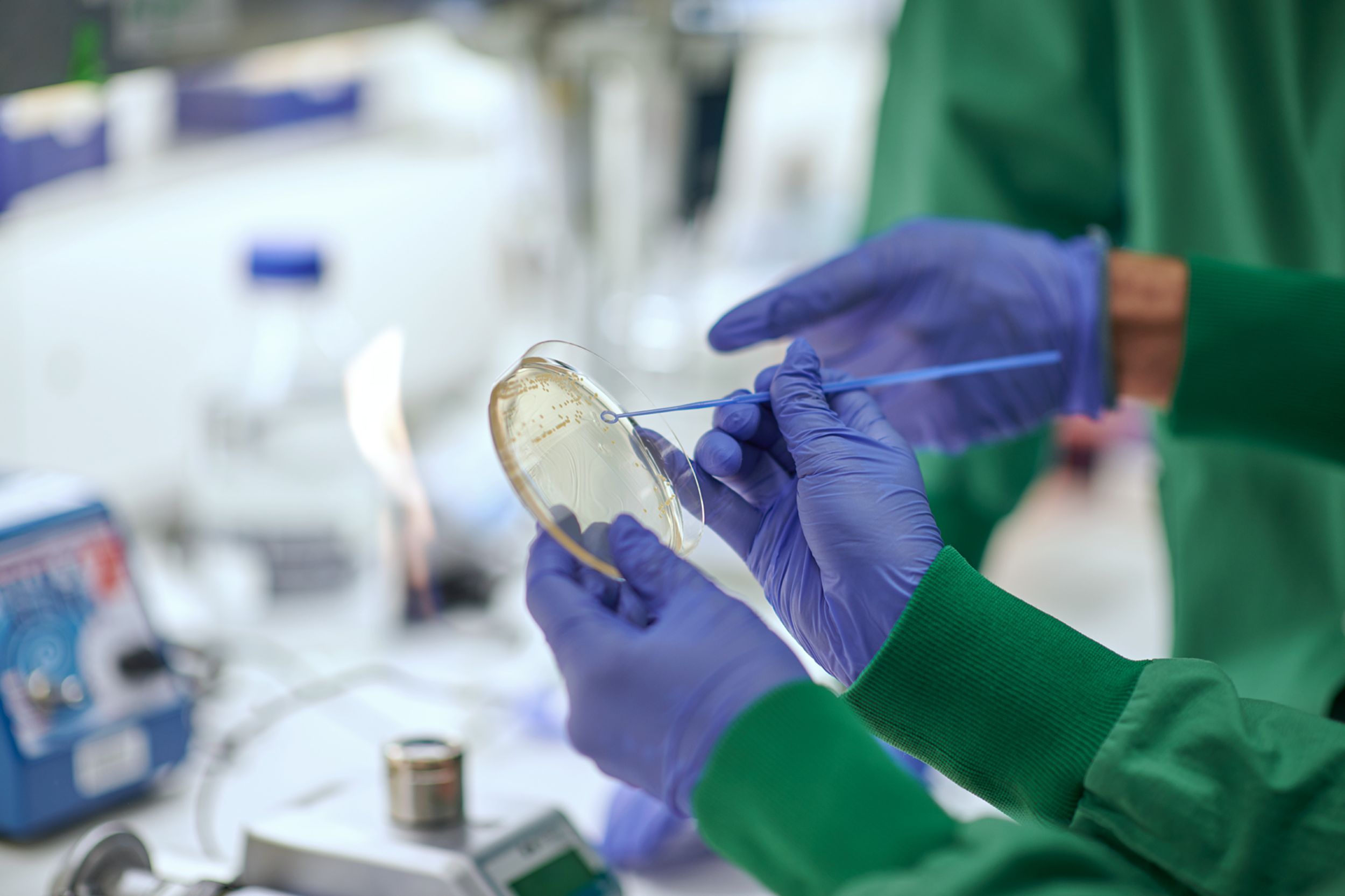
Research
The focus is on clinical work and the care of inpatients and outpatients, very often in interdisciplinary collaboration. Many, if not almost all, of the research projects in recent years have arisen from clinical issues that have arisen due to diagnostic and therapeutic advances and/or changes in procedures.
Clinical infectiology
Our research in the field of clinical infectious diseases focuses on epidemiological and clinical aspects of S. aureus infections and S. aureus colonization. In response to clinical problems encountered in the consultation service, other studies aim to improve the clinical management of patients with specific diseases (e.g. screening for tuberculosis, amoebic abscesses, infections with rare pathogens). We are also currently expanding our antibiotic stewardship program.
Specific research areas
Staphylococcus aureus
- Retrospective study on clinical and microbiological aspects of S. aureus infectionsat the University Hospital in Basel
- Epidemiology and risk factors for colonization with S. aureus and MRSA in at-risk populations (e.g. intravenous drug users, patients with rheumatoid arthritis)
Specific clinical problems associated with clinical work
- Screening for tuberculosis and treatment of refugees with pulmonary infiltrates
- Diagnosis of amoebic liver abscesses
- Value of procalcitonin as a diagnostic parameter for infections after neurosurgical procedures
- Atrial natriuretic peptide in severe sepsis and septic shock
Antibiotic stewardship
- Empirical antibiotic therapy in patients admitted via the emergency department
- Participation in the ARPAC (Antibiotic Resistance Prevention and Control) study: European study aiming to identify antibiotic policies, prescribing patterns and infection control measures associated with lower rates of antibiotic-resistant pathogens at individual hospital level
Infectious disease epidemiology
Our infection epidemiology research focuses on the mechanisms of transmission of Clostridioides difficile and Gram-negative bacteria with broad-spectrum beta-lactamase (ESBL). Surveillance of surgical site infections is another important focus, particularly research into foreign body infections. New hospital epidemiology interventions have been established at the University Hospital Basel in close collaboration with the Department of Clinical Microbiology. We have successfully introduced new typing methods that facilitate the investigation of transmission routes. We are the Swiss reference laboratory for C. difficile.
Infections in transplant patients
Specific research areas
Fungal infections
- FUNGINOS Fungal Infection Network of Switzerland: specialists from seven university hospitals and ten partner hospitals in Switzerland who deal with the epidemiology and management of fungal infections
- Invasive aspergillosis in bone marrow transplant patients
Infectious diseases in transplant patients
- Swiss Transplant Cohort Study (STCS): prospective study on post-transplant complications in organ and bone marrow/stem cell transplant recipients, including a prospective infection surveillance database
Transplant virology
- BK virus, EBV, CMV: Three research areas are currently being pursued: In the clinical area, the definition of risk factors and intervention strategies are being investigated. In the virological area, genotypic changes in the genome of the BK virus (BKV) are being investigated with regard to their functional consequences. In the immunological field, the characterization of the humoral and cellular immune response of kidney transplant patients is being investigated as a complementary surrogate marker which, together with the BKV viral load in plasma and urine, could enable the prediction of progression and regression of polyomavirus-associated nephropathy. Similar approaches are being pursued with regard to cytomegalovirus and Epstein-Barr virus in kidney, heart and stem cell transplant patients.
International HIV Care
A collaboration with the Swiss Tropical and Public Health Institute (Swiss TPH) www.swisstph.ch
In collaboration with scientists from partner organizations, we conduct epidemiological and clinical research in the field of chronic diseases in various countries in sub-Saharan Africa. The focus is on HIV/AIDS and tuberculosis. However, non-infectious chronic diseases such as hypertension, diabetes and mental health are also becoming increasingly important in our research.
Our projects combine research with improving clinical treatment in partner countries in Africa and offer training and career opportunities to young professionals in sub-Saharan Africa and Switzerland.
Team International HIV Care


Prof. Niklaus Labhardt
Leitender Arzt
Infektiologie & Spitalhygiene
Chefarzt Klinische Epidemiologie

Prof. Maja Weisser Rohacek
Leitende Ärztin
Infektiologie & Spitalhygiene
Leiterin Konsiliardienst
International HIV and Chronic Disease Care
Our group comprises 15 employees in Switzerland and over 100 employees in sub-Saharan Africa. Together with Swiss TPH, we conduct clinical, epidemiological and implementation studies with a focus on HIV, tuberculosis, COVID-19 and chronic non-communicable diseases. eHealth and self-developed clinical decision support apps play an increasing role. Our work focuses on innovative, evidence-based approaches to facilitate access to diagnosis and treatment of these diseases in countries with limited resources. We test new diagnostic and therapeutic approaches in large randomized trials. Several of our studies have influenced international treatment guidelines. Our group is active in an advisory capacity in various international bodies (WHO, IAS).
Our current project portfolio: www.swisstph.ch/hiv-and-chronic-diseases
Chronic Disease Clinic Ifakara
HIV in Tanzania continues to decline (-19% since 2010) with a 47% drop in mortality over the same period. Established in 2004, the Chronic Diseases Clinic Ifakara (CDCI) in the rural southwest of the country is a joint project of the Swiss Tropical and Public Health Institute, the Ifakara Health Institute in Tanzania, the Clinic for Infectiology & Hospital Hygiene at the University Hospital Basel and the St. Francis Referral Hospital in Ifakara, into which the CDCI is integrated. In addition to the clinical care of patients, the CDCI manages a patient cohort of over 11,000 people living with HIV - both adults and children. Research focuses on the response to therapy, the development of viral resistance and comorbidities, most importantly tuberculosis, but also increasingly non-communicable diseases such as arterial hypertension, renal insufficiency and diabetes mellitus. Another central focus is the treatment and prevention of mother-to-child transmission of HIV as well as HIV infections in children and adolescents.
Head of program
Prof. Daniel H. Paris
Head of the Department of Medicine, Swiss TPH
Partner organizations
- Ifakara Health Institute
- St. Francis Referral Hospital
- University Hospital Basel
- Swiss Tropical and Public Health Institute (Swiss TPH)
Websites
- www.swisstph.ch/de/projects/tanzania-chronic-disease-clinic-ifakara
- ihi.or.tz/chronic-diseases-care-treatment-center
Reports
HIV/AIDS
Research in the HIV field aims at reacting to new developments. We conduct studies regarding clinical-epidemiological questions such as immune recovery under therapy as well as prospective therapeutic trials. In addition, we aim at improving the safety and use of the antiretroviral therapy by studying drug-related toxicity and drug-interactions issues, and by defining the optimal time to start therapy. The HIV clinic of Basel is one of the Centers of the Swiss HIV Cohort Study and many studies are conducted within the frame of this observational, prospective, multi-center study.
Specific research topics
- Description of clinical course with and without therapy (CD4-T cell course, projects regarding best choice of therapy for specific patient groups).
- Prospective phase II and III studies.
- Studies in the medico-social and economic field.
- Pathophysiological studies in collaboration with the Institute of Medical Microbiology Basel and other Swiss groups within the frame of the Swiss HIV Cohort Study.
Patient's readiness to start ART (READY project)
- We study patient readiness to HIV treatment and aim at developing teaching tools to increase communication quality of health care providers.
Drug-drug interactions
- Potentially clinically relevant drug interactions have become a major issue in HIV therapy due to the ageing of the HIV-infected patients and increasing prevalence of co-medications. We aim at studying drug interactions that are challenging for HIV therapy.
Toxicity
- Adverse events to combination antiretroviral therapy are common reasons for treatment modification and poor adherence. We investigated predictors of treatment modification within the Swiss HIV Cohort Study. Although toxicity remains a frequent reason of treatment change, possibly due to the broad availability of alternative antiretroviral drugs, it does not alter treatment success. Close monitoring and management of side effects and drug-drug interactions are crucial for durability of cART.
Swiss HIV Cohort Study
The Swiss HIV Cohort Study has been serving people with HIV and AIDS since 1988 and has followed over 19,000 people during this time. It is committed to optimal patient care and excellent research activities.
Infection Biology Laboratory
In patients with immunodeficiency, for example in old age, following organ or stem cell transplants or HIV infections, infections with viruses, bacteria and fungi often lead to dangerous complications and sometimes even death. In this case, the interaction between innate and acquired immunity is out of balance and the control of infectious agents is inadequate.
The "Infection Biology " research group is headed by Prof. Nina Khanna. We investigate the complex interaction of the immune system with different pathogens in immunocompromised patients.
Our main focus:
- Immunological control of fungal infections
- Foreign body-associated infections
- Development of adjuvants for the improvement of vaccines.
1) Invasive fungal infections caused by Aspergillus fumigatus and Candida albicans are common infectious complications. Patients with severe, prolonged neutropenia and lymphopenia due to leukemia, after allogeneic stem cell transplantation and advanced HIV infection are particularly affected. Preemptive therapies or, more recently, prophylactic therapies are often used. The use of these therapy modalities is problematic, as breakthrough infections and infections caused by resistant pathogens can occur. Other problems include side effects, drug interactions and the high cost of medication.
Our aim is to identify patients at risk of invasive fungal infections at an early stage and to develop immunotherapeutic strategies such as vaccination or adoptive T-cell transfer.
2) Implants such as orthopaedic prostheses are being used more and more frequently in medicine due to the increasing age of the population. Approximately 1-2% of implants lead to infections after surgery. Foreign body-associated infections with Staphylococcus aureus are associated with significant morbidity and high costs. Due to the formation of a biofilm, such infections are very difficult to treat. Our research group is therefore investigating new therapeutic strategies such as new antimicrobial substances and surface coatings in collaboration with various universities and companies.
Our aim is to characterize new antimicrobial substances and their activity against biofilms and to explain their mechanism of action.
3) How well someone responds to a vaccination depends on the function of the immune system. The innate immune system is very important for the development of an acquired immune response, which protects against viruses and bacteria by producing antibodies, for example. This interplay between innate and acquired immunity plays an important role in "natural" infections, but also in vaccination. Genetic mutations in the innate immune system can therefore lead to poorer or better vaccine efficacy.
We are investigating how certain messengers of the innate immune system influence the vaccination response. Our focus here is primarily on a newly discovered class of interferons - the interferon lambda family. Interferon lambda has a strong influence on antibody-producing B cells and plasma cells.
Our aim is to investigate the influence of interferon lambda and genetic mutations in the interferon lambda genes in different infections and vaccinations. This should lead to the development of novel adjuvants in the future.
